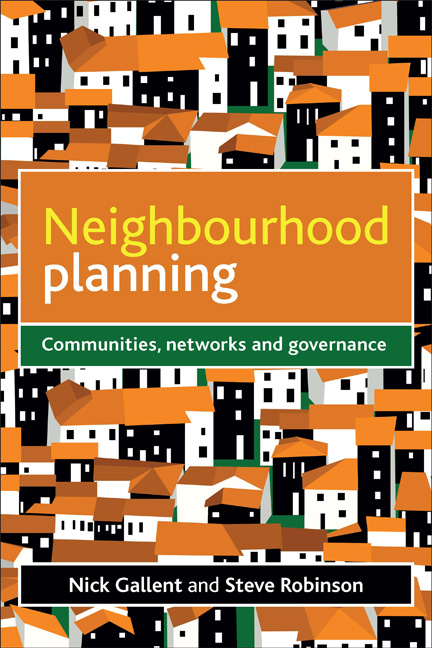Book contents
- Frontmatter
- Dedication
- Contents
- List of figures, images and table
- Abbreviations
- Acknowledgements
- Authors’ note
- Part One Democracy, planning and localism
- Part Two Capacity building and community-based planning
- Part Three The interface with policy actors
- Part Four Neighbourhood planning, leadership and democratic renewal
- References
- Index
fourteen - Responsibility and responsiveness: lessons from parish planning
Published online by Cambridge University Press: 07 September 2022
- Frontmatter
- Dedication
- Contents
- List of figures, images and table
- Abbreviations
- Acknowledgements
- Authors’ note
- Part One Democracy, planning and localism
- Part Two Capacity building and community-based planning
- Part Three The interface with policy actors
- Part Four Neighbourhood planning, leadership and democratic renewal
- References
- Index
Summary
The purpose of this and the next chapter is to reappraise some of the lessons arising from community-based parish planning in England, and to use these to illuminate the path of future local government reform and how networked community governance, of the type unpacked in the last 13 chapters, might realise its full potential in the years ahead. The narrative provided so far is distilled into a number of critical discussions around the mechanics of community-based planning, connectivity to strategic frameworks, and the responsibilities versus the responsiveness that communities seek through local action.
Lessons in community governance and support
The objective of neighbourhood or community-based planning is not solely to influence planning or even wider public policy. It has a crucial role in triggering collective interest, among residents, in local projects and in setting community priorities. Parish councils have been instrumental in this process, although how representative their views and priorities actually are is sometimes doubted. Councils, especially in areas popular with retiring households, may be dominated by older residents whose priorities differ from those of younger families. But this is not a universal pattern. Some parishes have a strong through-flow of participants, with the composition of their councils continually changing and mirroring shifts within communities themselves. Parish councils may form a discrete clique within a disengaged community, but the parish plan process may act to widen inputs and bring community benefits that outlast, and are often bigger than, the plan itself.
Community planning support groups have a critical part to play in this process. Alongside the important role they perform in connecting communities to service providers through a practical process of ‘bridging’, these groups also work with parish councils to widen inclusion in the participatory processes leading to plan production. As well as injecting additional skills and knowledge, support groups play a key part in ‘democratising’ the community planning process, broadening ownership of it. This is often their main function, although the desire of many communities to realise a more direct policy influence – through their plans – means that an increasing amount of effort is expended on plan implementation through ‘bridging’ activities.
- Type
- Chapter
- Information
- Neighbourhood PlanningCommunities, Networks and Governance, pp. 181 - 190Publisher: Bristol University PressPrint publication year: 2012



